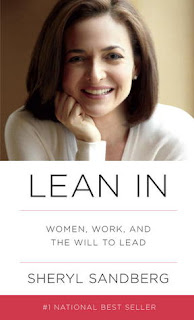Sheryl Sandberg’s Lean In is a massive cultural phenomenon and its title has become an instant catchphrase for empowering women. The book soared to the top of bestseller lists internationally, igniting global conversations about women and ambition. Sandberg packed theatres, dominated opinion pages, appeared on every major television show and on the cover of Time magazine, and sparked ferocious debate about women and leadership.
Ask most women whether they have the right to equality at work and the answer will be a resounding yes, but ask the same women whether they'd feel confident asking for a raise, a promotion, or equal pay, and some reticence creeps in.
The statistics, although an improvement on previous decades, are certainly not in women's favour – of 197 heads of state, only twenty-two are women. Women hold just 20 percent of seats in parliaments globally, and in the world of big business, a meagre eighteen of the Fortune 500 CEOs are women.
In Lean In, Sheryl Sandberg – Facebook COO and one of Fortune magazine's Most Powerful Women in Business – draws on her own experience of working in some of the world's most successful businesses and looks at what women can do to help themselves, and make the small changes in their life that can effect change on a more universal scale.
Flo's Review
Okay, this is going to be an interesting review to write; I was listening to this on audiobook, and every time I heard something I wanted to comment on I thought, "I need to go home and write this down!" Guess how many times I got home and wrote things down?!? (If you guessed zero, you are 100% correct.) And since I listened to the audiobook, I don't have a physical copy of the book to refer back to. So this review will be commenting on what I can remember. Here goes!
When I first started Lean In, I wasn't feeling it. First of all the narrator was alright, but very intense sounding. Like she read every single sentence as if it was the last sentence and the most important sentence you'd ever hear. I understand why, but it translated as exhausting to listen to. Secondly, this book is very data heavy, and it hits hard in the beginning. I was just hearing a lot of numbers, numbers, data, studies, numbers and they were all just flying around my head and not sticking.
But I didn't stop, and somewhere along the way everything must have started sticking. Lean In is actually one of the books I've had the most emotional and personal response to in awhile, and that is why I giving it 5 out of 5 stars. I got the audiobook at ALA, and kept it among the many other "girl power" books I managed to pick up.
 |
| Who runs the world? GIRLS. |
There were so many good points that I took to heart while reading this. The idea that we are no longer talking about climbing a corporate ladder, but instead making our way up a corporate jungle gym was fantastic. There's no one way to career success, and it doesn't have to be a straight shot. Having been in several organizations that have tried and been unsuccessful in mentorship, I found the chapter about "Are you my mentor?" interesting. The idea with that one was that mentors are needed, yes, but forced mentors won't make or break anyone. Sandberg talks about the idea that if women are going to lean in to their careers, men need to lean in to family and home life: raising the children, doing things around the house, etc. And of course the simple idea that in order to make a work environment that fosters women to grow in their careers, we need women at the top who can understand what women need. Yes and yes and yes and yes.
I did struggle with a few things about the book. Sandberg came across as preachy a lot of the times. She had a lot of "I believe..." statements, but she also had a lot of "We must..." and "This can't happen..." statements, too. And a few times she did the thing where she highlighted a problem, declared that it must be changed, but offered no ideas on how to change it. One example that stands out in mind is the idea that companies are often afraid to ask women questions about their family life because they are afraid of getting sued. Sandberg was pretty much like -- and I'm paraphrasing here --, "I don't know how to fix this problem, but it's a problem, and it must be fixed."
My sister is a physician and she always jokes that people never tell her husband, "Wow, you're so lucky, you married a doctor!" Lean In is looking toward a world where women doctors, male nurses, women CEOs, male stay-at-home parents are not the exception, but the norm. I agree with Sandberg that this generation is not there yet. But we will continue to work at it and be an example for our children, and we can hope that the next generation will be closer to this ideal of equality.

No comments :
Post a Comment